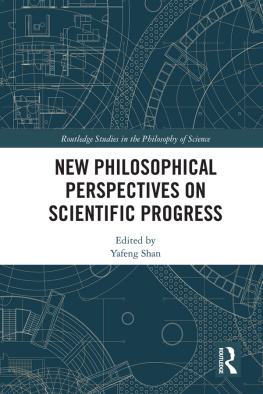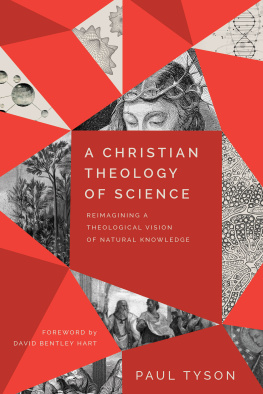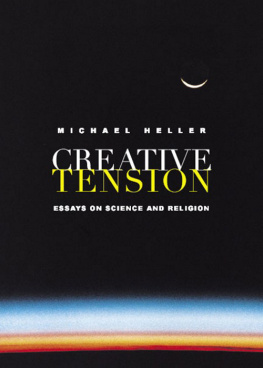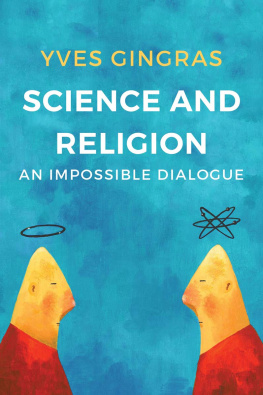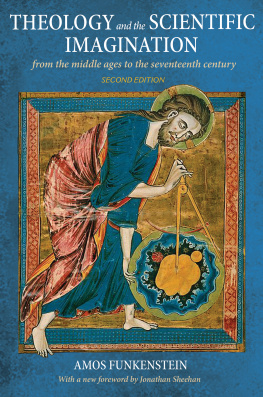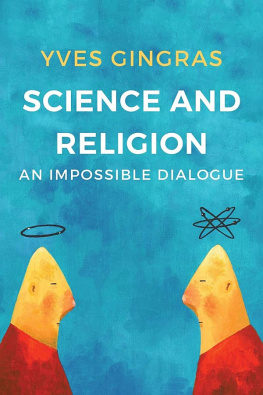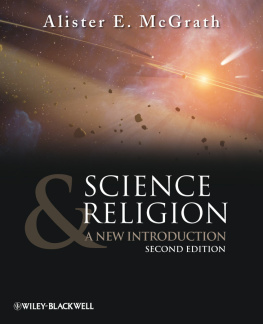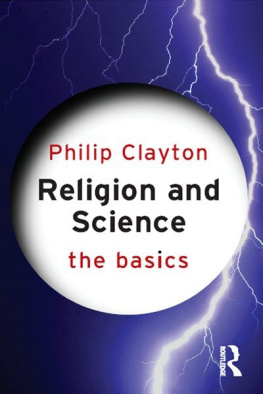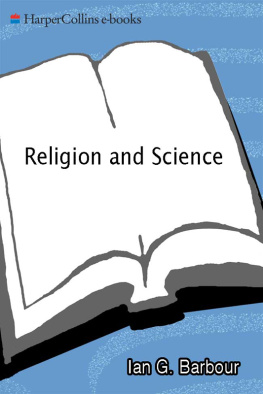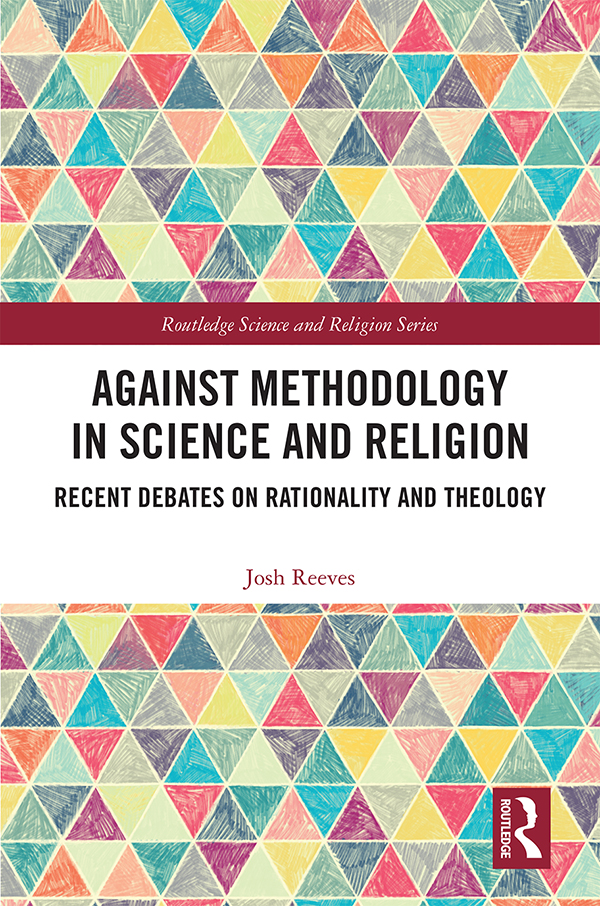Contents
Against Methodology in Science and Religion
Since its development as a field over the last part of the twentieth century, scholars in science and religion have been heavily concerned with methodological issues. Following the lead of Thomas Kuhn, many scholars in this interdisciplinary field have offered proposals that purport to show how theology and science are compatible by appropriating theories of scientific methodology or rationality. Arguing against this strategy, this book shows why much of this methodological work is at odds with recent developments in the history and philosophy of science and should be reconsidered.
First, three influential methodological proposals are critiqued: Lakatosian research programs, Alister McGraths Scientific Theology, and the postfoundationalist project of Wentzel van Huyssteen. Each of these approaches is shown to have a common failing: the idea that science has an essential nature, with features that unite scientific or even rational inquiry across time or disciplines. After outlining the issues this failing could have on the viability of the field, the book concludes by arguing that there are several ways scholarship in science and religion can move forward, even if the terms science and religion do not refer to something universally valid or philosophically useful.
This is a bold study of the methodology of science and religion that pushes both subjects to consider the other more carefully. As such, it will be of great interest to scholars in religious studies, theology, and the philosophy of science.
Josh Reeves is Assistant Professor of Science and Religion at Samford University, USA. Having run the New Directions in Science and Religion project, he has also written multiple articles on science and religion for peer-reviewed journals and is a coauthor of A Little Book for New Scientists (2016).
Against Methodology in Science and Religion
Recent Debates on Rationality and Theology
Josh Reeves

First published 2019
by Routledge
2 Park Square, Milton Park, Abingdon, Oxon OX14 4RN
and by Routledge
711 Third Avenue, New York, NY 10017
Routledge is an imprint of the Taylor & Francis Group, an informa business
2019 Josh Reeves
The right of Josh Reeves to be identified as author of this work has been asserted by him in accordance with sections 77 and 78 of the Copyright, Designs and Patents Act 1988.
All rights reserved. No part of this book may be reprinted or reproduced or utilised in any form or by any electronic, mechanical, or other means, now known or hereafter invented, including photocopying and recording, or in any information storage or retrieval system, without permission in writing from the publishers.
Trademark notice: Product or corporate names may be trademarks or registered trademarks, and are used only for identification and explanation without intent to infringe.
British Library Cataloguing-in-Publication Data
A catalogue record for this book is available from the British Library
Library of Congress Cataloging-in-Publication Data
Names: Reeves, Josh A., 1976 author.
Title: Against methodology in science and religion : recent debates on rationality and theology / Josh Reeves.
Description: Abingdon, Oxon; New York, NY : Routledge, 2019. | Series: Routledge science and religion series | Includes bibliographical references and index.
Identifiers: LCCN 2018027268 (print) | LCCN 2018030787 (ebook)
Subjects: LCSH: Religion and scienceMethodology.
Classification: LCC BL240.3 (ebook) | LCC BL240.3 .R4338 2018 (print) | DDC 201/.65dc23
LC record available at https://lccn.loc.gov/2018027268
ISBN: 978-1-138-47794-0 (hbk)
ISBN: 978-1-351-10377-0 (ebk)
Typeset in Sabon
by codeMantra
Routledge Science and Religion Series
Series editors:
Michael S. Burdett, Wycliffe Hall, University of Oxford, UK
Mark Harris, University of Edinburgh, UK
Science and religion have often been thought to be at loggerheads, but much contemporary work in this flourishing interdisciplinary field suggests this is far from the case. The Science and Religion Series presents exciting new work to advance interdisciplinary study, research, and debate across key themes in science and religion. Contemporary issues in philosophy and theology are debated, as are prevailing cultural assumptions. The series enables leading international authors from a range of different disciplinary perspectives to apply the insights of the various sciences, theology, philosophy, and history in order to look at the relations between the different disciplines and the connections that can be made between them. These accessible, stimulating new contributions to key topics across science and religion, will appeal particularly to individual academics and researchers, graduates, postgraduates, and upper-undergraduate students.
Being as Communion
A Metaphysics of Information
William A. Dembski
The Roots of Religion
Exploring the Cognitive Science of Religion
Edited by Roger Trigg and Justin L. Barrett
The Intelligent Design Debate and the Temptation of Scientism
Erkki Vesa Rope Kojonen
Science and the Truthfulness of Beauty
How the Personal Perspective Discovers Creation
Robert Gilbert
Against Methodology in Science and Religion
Recent Debates on Rationality and Theology
Josh Reeves
For more information and a full list of titles in the series, please visit: https://www.routledge.com/religion/series/ASCIREL
Contents
For Ruby and June
What makes science, science? This simple question evades simple answers. Countless philosophers over the centuries have tried to identify unique features that make science distinct from other types of intellectual activity. However one answers this question, it will have different implications for how science relates to theological or religious doctrine. Almost all religious traditions speak of taking science seriously, but they can have very different ideas about what constitutes proper science.
Though I had been interested in the relationship between science and Christianity for many years, I had not fully grappled with the difficulty of defining science when I enrolled in the Science & Religion program at Boston University. It was thereand especially in the History of Science and Christianity class taught by Jon Robertswhere I began to appreciate science in all its complexity. It was a wonderfully bewildering experience to find many of my assumptions challenged by historians and sociologists of science. The ultimate outcome of that experience is this book.
A book that has taken over half a decade to writeespecially one conceived as one changes and develops intellectually over graduate schoolincurs many debts. I am especially thankful for my time at Boston University. I would not have been able to produce this book without its unique interdisciplinary Science & Religion program, along with the professors (Jon Roberts, Bob Neville, Kirk Wegter-McNelly) with the teaching and scholarly ability to make it a success. Special mention goes to Wesley Wildman, leader of the program and my advisor, for his leadership and intellectual prodding. Wesleys comprehensive grasp of so much technical detail in philosophy, science, and religion inspired and pushed his students to new intellectual heights of their own. The conversations and comradery with my fellow studentsespecially Rick Peters, Paul Cassell, Sarah Fredericks, Nat Barrett, and Dan Newkirkmade my time in Boston special.


